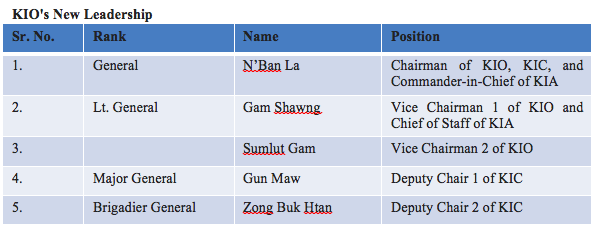The Kachin Independence Organization (KIO) has marked the new year with its first major leadership reshuffle since 2016.
As a member of the Federal Political Negotiation and Consultative Committee (FPNCC), the KIO is one of the ethnic armed organizations that have yet to sign the Nationwide Ceasefire Agreement (NCA).
General N’Ban La has been appointed chairman of the KIO, replacing Lanyaw Zawng Hra, who is retiring after more than a decade in charge to make way for a younger generation of leaders. Lanyaw Zawng Hra replaced General Lamung Tu Jai as KIO chairman when he died in 2006.
New leaders were appointed to five senior positions: KIO chairman, vice chairman 1 and 2, and deputy chairman 1 and 2 of the Kachin Independence Council (KIC).
Gen N’Ban La’s appointment was largely expected, as the organization’s vice chairman traditionally replaces the outgoing chairman.
His path to the top spot was cleared by the 2015 ouster of then-Vice Chairman Lieutenant General Gauri Zau Seng, ostensibly due to his age. Gen N’Ban La filled the vice chairman position the following year, presumably with an eye toward ascending to helm the KIO.
The appointment solidifies Gen N’Ban La’s grip on power within the overall organization, as he is now chairman of both the KIO and KIC, as well as commander-in-chief of the KIO’s armed wing, the Kachin Independence Army (KIA).
Gen N’Ban La is known for his ability to dispose of potential rivals within the KIO. The first occasion was in 2001, when he orchestrated the ouster of the then chairman, Lieutenant General Mali Zup Zau Mai, paving the way for Gen Lamung Tu Jai’s appointment. A second crackdown occurred on Jan. 7, 2004, at Pajau, the old KIO/A headquarters on the Chinese border. General N’Ban La, who was then KIA chief of staff, purged a handful of senior officers who had attempted a coup against him with the aim of replacing him with then intelligence chief, Colonel Lasang Aung Wah. Since that time, Gen N’Ban La has enjoyed been hailed by his subordinates as the savior and protector of the KIO/A.
Many Kachin observers now believe that having consolidated his leadership, Gen N’Ban La will lead the organization with a new, more military-oriented policy.
As part of the reshuffle, KIA chief of staff Lieutenant-General Gam Shawng, a former deputy chair 1 of the KIC, was promoted to vice chairman 1 of the KIO. Sumlut Gam, a former KIO chief negotiator, becomes vice chairman 2. Major General Gun Maw, formerly deputy chair 2 of the KIC, was promoted to deputy chair 1. Brigadier General Zong Buk Htan becomes deputy chair 2.
The shakeup was apparently implemented to create a new political landscape within the KIO and beyond.
What’s in Store for 2018?
According to a statement released by the KIO on Dec. 30, the group plans to consult the Kachin public and seek its input on a new set of policies.
After pulling out of the United Nationalities Federal Council (UNFC), the KIO allied itself with another set of ethnic armed groups in the FPNCC. Gen N’Ban La holds the position of deputy chair in the bloc. The FPNCC is an alliance comprising the United Wa State Party (UWSP), Kachin Independence Organization (KIO), National Democratic Alliance Army (NDAA), Shan State Progress Party/Shan State Army-North (SSPP/SSA-N), Ta’ang National Liberation Army (TNLA), Kokang Myanmar National Democratic Alliance Army (MNDAA) and Arakan Army (AA).
The KIO will continue to support the FPNCC’s policy regarding Myanmar’s peace process. The bloc has said that if invited it would attend the third session of the 21st Century Panglong Peace Conference initiated by State Counsellor Daw Aung San Suu Kyi, scheduled to be held later this month, possibly next month. However, fighting between the Tatmadaw (Myanmar’s military) and the KIA has escalated of late, with no end in sight. Most recently, the Tatmadaw has staged attacks on several KIA battalions and outposts with ground forces, artillery and airstrikes, particularly in the amber-rich Tanai area in western Kachin State.
In fact, 2017, which the National League for Democracy-led government had promised would be a year of peace, turned out to be a year of suffering for many, with the government failing to address the Rakhine crisis and seemingly endless civil conflicts.
Once, while being interviewed by journalists after participating in the opening ceremony of the second session of the 21st Century Panglong Peace Conference and privately meeting with Daw Aung San Suu Kyi in Naypyidaw, Gen N’Ban La claimed that “We [the KIO] never do an unsuccessful thing.”
In 2018, we will have to wait and see whether he can lead the KIO to negotiate with the military and the government to bring peace to Kachin State.

Joe Kumbun is the pseudonym of a Kachin State-based analyst.

















